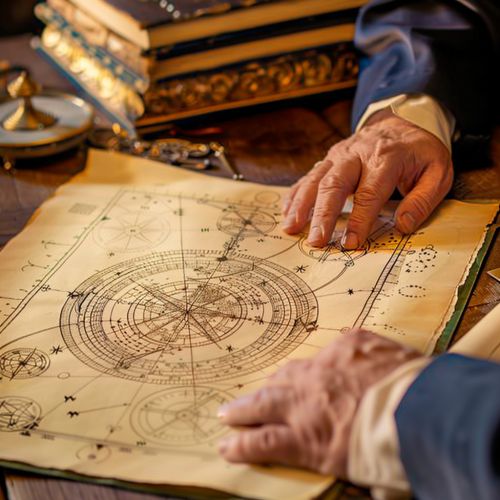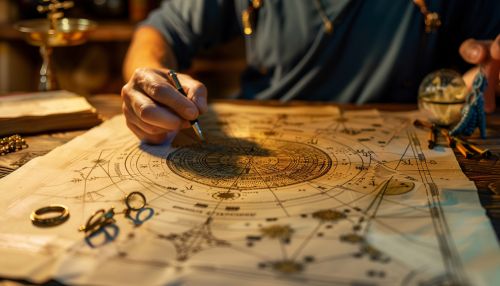Horary Astrology
Introduction
Horary astrology is a branch of astrology that answers specific questions by constructing a horoscope for the exact time at which the question was posed. This practice is distinct from natal astrology, which focuses on the birth chart of an individual. Horary astrology has been a significant part of astrological traditions for centuries, offering insights into various aspects of life, including relationships, career, health, and more.
Historical Background
Horary astrology has its roots in ancient civilizations, including Babylonian, Egyptian, and Greek cultures. The practice was further refined during the medieval period by Islamic scholars such as Al-Biruni and Abu Ma'shar. It gained prominence in Europe during the Renaissance, with notable contributions from astrologers like William Lilly, whose work "Christian Astrology" remains a cornerstone in the field.
Principles and Techniques
The Question
In horary astrology, the accuracy of the answer depends significantly on the clarity and sincerity of the question. The question must be specific, and the querent (the person asking the question) should be genuinely concerned about the issue. The astrologer constructs the chart for the exact moment the question is understood.
The Chart
The horary chart is a snapshot of the sky at the moment the question is posed. It includes the positions of the Sun, Moon, and planets, as well as the Ascendant and Midheaven. The houses in the chart represent different areas of life, and their rulers play a crucial role in the interpretation.
Significators
Significators are the planets that represent the querent and the subject of the question. The Ascendant and its ruler typically signify the querent, while the house relevant to the question and its ruler signify the subject. For example, in a question about a job, the 10th house and its ruler would be significant.
Aspects
Aspects are the angles between planets, which indicate the nature of the relationship between the significators. Major aspects like conjunctions, sextiles, squares, trines, and oppositions are crucial in determining the outcome. A favorable aspect suggests a positive outcome, while a challenging aspect may indicate obstacles.
Reception
Reception occurs when one planet is in a sign ruled by another planet, indicating a relationship between the two. Mutual reception, where two planets are in each other's signs, often suggests cooperation and a favorable outcome.
Timing
Timing in horary astrology can be complex. It involves analyzing the Moon's aspects and the movement of significators. The timing can be indicated in days, weeks, months, or even years, depending on the context of the question and the positions of the planets.


Applications of Horary Astrology
Personal Relationships
Horary astrology can provide insights into personal relationships, including romantic partnerships, friendships, and family dynamics. Questions about the future of a relationship, compatibility, and potential conflicts can be explored through horary charts.
Career and Finance
Questions about career prospects, job changes, and financial investments are common in horary astrology. The 10th house and its ruler are often examined for career-related questions, while the 2nd house and its ruler are significant for financial matters.
Health and Well-being
Health-related questions are addressed by examining the 6th house and its ruler, along with the condition of the Moon and other relevant planets. Horary astrology can provide insights into the nature of an illness, potential treatments, and recovery prospects.
Lost Objects
One of the unique applications of horary astrology is locating lost objects. The 2nd house and its ruler, along with the Moon's aspects, are analyzed to determine the location and likelihood of recovering the lost item.
Legal Matters
Horary astrology can also be used to explore legal issues, including lawsuits, contracts, and disputes. The 7th house and its ruler are significant in these questions, as they represent legal matters and opponents.
Ethical Considerations
Ethical considerations are paramount in horary astrology. Astrologers must maintain confidentiality, provide honest and unbiased interpretations, and avoid making predictions that could cause undue stress or harm. It is essential to approach each question with integrity and respect for the querent's concerns.
Criticisms and Controversies
Horary astrology, like other forms of astrology, faces criticism from the scientific community. Critics argue that there is no empirical evidence to support the validity of astrological predictions. However, practitioners and proponents of horary astrology argue that its accuracy and usefulness lie in its symbolic and interpretative nature.
Conclusion
Horary astrology is a fascinating and intricate branch of astrology that offers valuable insights into specific questions and concerns. Its rich history, detailed techniques, and diverse applications make it a unique tool for those seeking guidance. While it may face skepticism, its enduring presence in astrological traditions speaks to its significance and utility.
